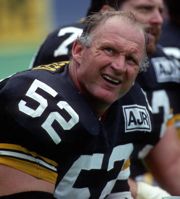NFL reportedly paid $2 million in disability to former players, despite denying link between football and brain damage
 A joint investigation conducted by ESPN’s “Outside the Lines” and PBS’ “Frontline” show could shed new light onto the issues surrounding the long-term effects of concussions players suffer while playing in the NFL. Despite the fact that the NFL has consistently denied any link between playing in the NFL and long-term brain damage, unpublished documents and medical records revealed that the league paid at least $2 million in disability benefits to players in the late 1990s and early 2000s.
A joint investigation conducted by ESPN’s “Outside the Lines” and PBS’ “Frontline” show could shed new light onto the issues surrounding the long-term effects of concussions players suffer while playing in the NFL. Despite the fact that the NFL has consistently denied any link between playing in the NFL and long-term brain damage, unpublished documents and medical records revealed that the league paid at least $2 million in disability benefits to players in the late 1990s and early 2000s.
According to the investigation, the disability board determined in 1999 that Hall of Fame center Mike Webster and other players suffered brain damage while playing. Awarding players compensation for head injuries completely contradicts the public stance the NFL has taken regarding concussions.
Bob Fitzsimmons, a lawyer who represented Webster in 1999 and co-director of the Brain Injury Research center, said the settlements could create major issues for the NFL.
“It’s pretty devastating evidence,” Fitzsimmons said. “If the NFL takes the position that they didn’t know or weren’t armed with evidence that concussions can cause total disability — permanent disability, permanent brain injury — in 1999, that evidence trumps anything they say.”
More than 4,000 players filed an official lawsuit against the NFL over the summer seeking compensation for the long-term effects of concussions they sustained during their NFL playing days. The lawsuit cites “intentional misrepresentation” and “negligence” by the league for allegedly not making players aware of the risks involved with playing the game.
News that the NFL once compensated players for brain damage obviously gives the plaintiffs added leverage. When compensating Webster in 1999, the NFL disability board — basing its findings on five doctors — reportedly determined that he was “totally and permanently disabled” as a result of repeated blows to the head during his 17-year playing career.
“The Retirement Board determined that Mr. Webster’s disability arose while he was an Active Player,” Sarah E. Gaunt, director of the NFL’s retirement plan, wrote in a letter to Fitzsimmons in 2000. “(The medical reports) indicate that his disability is the result of head injuries he suffered as a football player with the Pittsburgh Steelers and Kansas City Chiefs.”
It was determined that the board granted two other players “total and permanent” disability because of mental impairment. Other interviews and documents, which ESPN and PBS could not verify, indicate that other players also received compensation for head injuries after they had retired. Many of those individual cases were considered to be “confidential.”
This is obviously incredibly bad news for the NFL, as it basically proves they have admitted that playing football can lead to serious long-term brain damage, which is exactly what they have been attempting to disprove for years. The NFL has declined to comment but spokesman Greg Aiello wrote in an email that decisions made by the retirement board are independent and “are not made by the NFL or by the NFL Players Association.” More to come on this, I’m sure.
